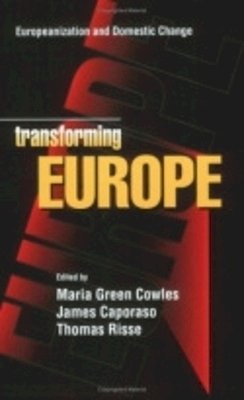
Transforming Europe : Europeanization and Domestic Change (Cornell Studies in Political Economy)
Maria Green Cowles (Ed.)
Does the European Union change the domestic politics and institutions of its member states? Many studies of EU decisionmaking in Brussels pay little attention to the potential domestic impact of European integration. Transforming Europe traces the effects of Europeanization on the EU member states. The various chapters, based on cutting-edge research, examine the impact of the EU on national court systems, territorial politics, societal networks, public discourse, identity, and citizenship norms.
The European Union, the authors find, does indeed make a difference—even in Germany, France, and the United Kingdom. In many cases EU rules and regulations incompatible with domestic institutions have created pressure for national governments to adapt. This volume examines the conditions under which this "adaptational pressure" has led to institutional change in the member states.
Product Details
About Maria Green Cowles (Ed.)
Reviews for Transforming Europe : Europeanization and Domestic Change (Cornell Studies in Political Economy)
Kenneth Dyson, University of Bradford
Journal of European Area Studies
Transforming Europe provides a very clear and well-written exploration of the mechanisms underpinning the Europeanization of member states' domestic structures.... This volume provides an insightful contribution to our understanding of these processes and serves as a valuable starting point for students of the field.
Avril Keating, University of Cambridge
The Journal of European Affairs
Europe has been uniting for about half a century.... Integration may be slow in overcoming fierce national identities, but the authors emphasize that Europeanization is unlikely to mean homogenization in the future.
The Futurist
The theme of this transatlantic-edited collection is the impact of 'Europeanization' upon the domestic structures of the member states of the European Union. The essays are a contribution to long-running scholarly debates about the nature of the European Union, how it generates and is receptive to change, and how it creates pressure for change within its fifteen member states. Whilst this may seem a rather inward-looking subject for investigation, the book is a contribution to broader debates about the nature of the European integration; and indeed of the role of the United States, of global economic pressures, and of systematic change upon states.
Anne Deighton, Oxford University
The International History Review
Transforming Europe is a book containing rich empirical studies on a wide-ranging number of issues related to the general question of the transformation of the nation-state under pressure from European integration. The open-ended conclusions signify that the research agenda of Europeanization is still in its preliminary stages, and that much more work needs to be done. Most importantly, this book is driven by an elaborate theoretical framework that will set the tone for such future work on Europeanization. It is sure to become a classic in the field of European integration studies.
Maarten Vink
Acta Politica
